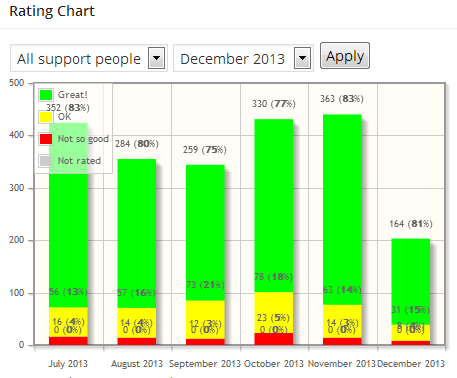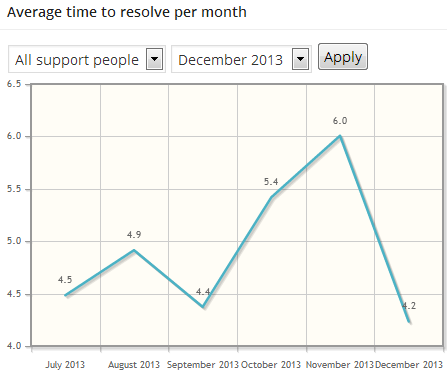Running a support organization that serves over 400,000 multilingual sites is a project by itself. In this post, we provide a peek into our support and what we did over time to optimize it.
The challenge – over 400,000 sites, 7 languages, round the clock support
WPML powers multilingual websites from all over the world, in practically every human language and with almost every WordPress theme and plugin. Even when things work perfectly, there’s still need for friendly, human support.
Where clients need the most support
Roughly speaking, we can separate the support into these:
- How to do stuff
- How to translate texts in themes and plugins
- Troubleshoot problems
- Compatibility issues with major themes and plugins
And, our challenge is to:
- Provide timely and accurate help to everything that has a simple solution (95% of the cases)
- Allocate enough development resources to handle the tough nuts and see them through
Tiered support for fast response and detailed debug
The solution is to organize the support in tiers. This allows us to give the fastest response to the vast majority of the support requests, while carefully analyzing and debugging the more complex cases.
First tier for 90% of the cases – most clients only know our first tier support staff, because their questions are handled there. The aim of first tier support is to truly understand the issue, get all required information and provide a working solution. Speed and accuracy are critical here. It’s also what we monitor in our benchmarks (more on this later).
Second tier debug issues – some support request require debug work. For example, when something should do X, but actually does Y. Everything that the client does appears correct, but WPML does something that doesn’t seem right. We reproduce it and debug. In many cases, this debug work will point to a configuration issue that we haven’t noticed, so the client gets a quick workaround. If we identify a bug or compatibility issue, the support continues to third tier.
Third tier resolves compatibility issues and fixes bugs – from time to time, support uncovers problems that have to be fixed in the code. Always, we prioritize fixing bugs and compatibility issues over building new functionality. WPML third tier support is usually the development team. In many cases, the supporter who raised the issue is highly involved in fixing the problem and verifying that the fix solves the client problems.
Analyzing recurring issues and improving the products
Over the years, the install base of WPML has grown significantly, but the size of our support team grew much slower. In parallel with that, customer satisfaction went up and the time from first support request to resolution is down. How is this possible?
We keep an open loop and frequent updates from the support team to development and documentation. In fact, much of our recent development started from the support forum. About a year ago, we noticed that many clients need to run multilingual e-commerce sites. This led us to become involved in WooCommerce plugin and develop WooCommerce Multilingual. As the project progressed, we got valuable feedback from clients about the features that they need most and how things should work.
After we relaunched WooCommerce Multilingual, to handle these needs, the support around multilingual e-commerce sites dropped significantly. Instead of repeatedly answering the same questions, we actually removed the need for support. At the time I’m writing this post, the most frequent support questions for WooCommerce relate to its extensions. Naturally, this is our next priority for WooCommerce Multilingual development. Makes sense?
A similar development cycle went on recently with performance enhancements. Very clearly, when supporters report frequent issues to the development team, we can improve the product and make everyone’s lives better. For this to happen, our support team does more than answer questions. They analyze what’s really behind recurring issues and bring this knowledge into the organization.
Customer feedback lets us benchmark ourselves and improve
How can members of the support team know that they are doing a good job? Can they do anything to improve and make clients happier?
This is where customer feedback and benchmarks come into action.

When a support thread is resolved, we ask clients to tell us how they feel about the help they received. We record this information, per support person and keep it over time.
Every member of the support team sees how he or she is doing compared to others. Naturally, supporters get good rating when they solve problems quickly and in a friendly tone. Seeing your numbers and comparing them to others tells you how good you are and where you can improve. Without adding another word, this leads to a healthy self-improvement process, which benefits clients and supporters.
We want to make sure that clients get the fastest service they can get, so we also record the time it takes to complete support issues.

When we see peaks, we always check what’s causing them. In the example above, a major WordPress update triggered more support issues. In that case, we had little to do, because many of the threads were actually related to theme issues. So, we made sure that the support is aware of the situation and can analyze theme issues more efficiently. Numbers are back to record low in December.
Training and improvement programs
WordPress today is a pretty complex beast. WPML, with all its components, is around the size of WordPress. To work as a supporter, requires a lot of training.
When new supporters join our team, they get several weeks of on-the-job training. We have an ever-evolving knowledge center, which we use as a training program. Subjects start with very basics and cover everything through WordPress API and WPML code organization.
After their training period completes, supporters start working in moderated mode. They take support threads but their replies are vetted by a senior supporter. This provides opportunity for further improvement. When supporters feels comfortable taking on clients, they already have plenty of experience. Clients often cannot tell that a ‘new’ support member is helping them.
Native language support is faster and more efficient
In the spirit of helping clients resolve problems faster, we quickly understood that communication is a key issue. If the support team doesn’t exactly understand the problem and the client doesn’t understand the solution, everything takes longer and frustration raises.
Today, our support team comes from different countries. We recruit support staff based on their skills and friendliness and also based on their location. For example, when we saw greater need from North American clients, we advertised for support staff in North and South America. Same time zone. Today, we provide real-time support in 19 hours of the day, covering everything from China to US West coast. Hawaii and Tahiti are less well covered, but we’re getting there 🙂
At the moment, we are actively looking for native French and Italian supporters, working in European time zone. If you’re up to the task, you are welcome to contact us and apply.
